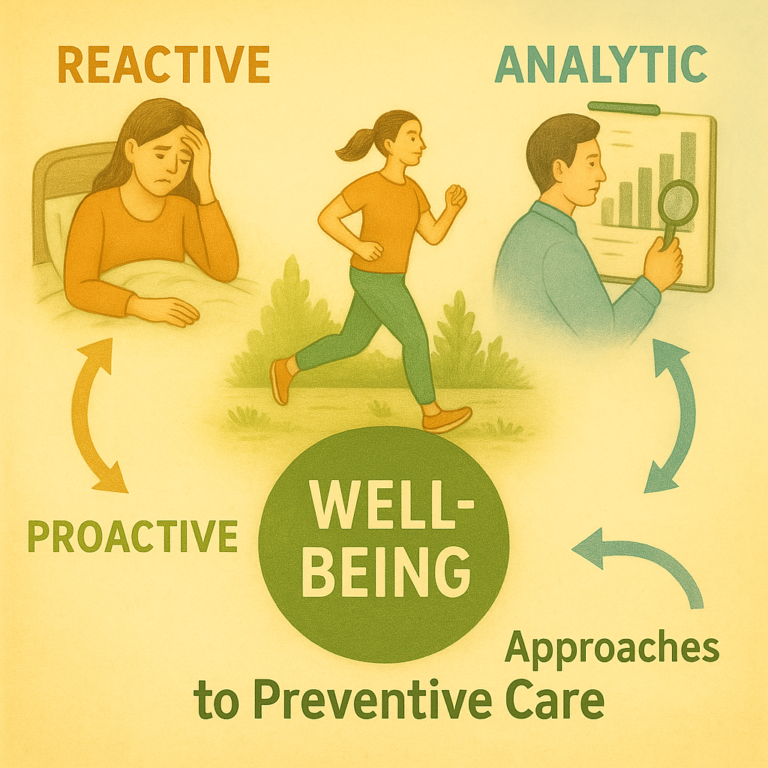Mental health and physical health are equally important. And so is the preventive care!
Preventive care is not limited to annual screenings or scans, it includes all activities you do in order to be mentally and physically fit.
What is preventive care?
Any medical care, therapy or any life style changes done in order to stay fit and healthy is called preventive care.
It can be as simple as watching our diet or taking a small walk every day. It can be watching food intake, or adding few steps in daily activity.
Or just doing annual check up and bloodwork.
In short, when you see a doctor or a specialist & take any preventive measure – just to keep your health in best shape, is called preventive care.
When you see a doctor or a specialist for any disease, complain or condition & do some lifestyle changes to ease the symptoms, it is for the cause – if it is a treatment or part of any treatment.
It is called a treatment of that disease or condition, while some of them still account to preventive measures.
For example, individuals who developed heart burns or acid reflux lately, will start to watch their diet. They do changes in their lifestyle to prevent acid reflux, is a preventive care though not started prior to symptoms!
Statistics of preventive care effect
Preventive care plays a crucial role in reducing the burden of diseases. Here are some key statistics from reliable sources:
- Per CDC data, 60% of adult Americans have at least one chronic disease, and 42% have multiple diseases—many of which could be mitigated with preventive care.
- One-third of all deaths in the U.S. are due to heart disease or stroke, both of which can be significantly reduced through preventive measures like screenings and lifestyle changes.
- Millions of people in the U.S. do not receive recommended preventive health services, despite their proven benefits in reducing disease, disability, and death.
- Preventive screenings and wellness visits have shown to improve early detection and management of chronic diseases, helping to reduce long-term health complications.
Why preventive care is ignored?
Usually, people start any new routine when they notice some symptoms or discomfort due to other primary obligations in their life.
Several factors contribute to why people ignore or delay preventive health measures:
1. Lack of Immediate Urgency
- Preventive care focuses on avoiding future health issues, but since people don’t feel sick at the moment, they may not see it as a priority.
- Many individuals only seek medical attention when symptoms appear, rather than proactively preventing illness.
2. Financial Barriers
- Health screenings, vaccinations, and wellness check-ups may be costly or not fully covered by insurance.
- The expense of healthier food, gym memberships, or lifestyle modifications discourages individuals from investing in preventive care.
3. Time Constraints
- Busy schedules make it difficult for individuals to prioritize routine check-ups and wellness activities.
- Many feel they can’t afford to take time off work or personal commitments for preventive care.
4. Lack of Awareness
- Some people are unaware of the benefits of preventive care or don’t understand how early intervention can prevent major health issues.
- Misinformation about vaccines, screenings, or healthy habits can create confusion and skepticism.
5. Cultural and Social Norms
- In some communities, seeking healthcare only when symptoms arise is the norm.
- Mental health and preventive wellness practices may still carry stigma, preventing people from taking proactive steps.
- Family try to conceal as much as they can, specially if patient is a young kid or teen. They do not seek help until it gets our of control!
6. Fear or Avoidance
- Fear of medical diagnoses or potential negative findings may cause individuals to delay screenings.
- Some prefer not to deal with the stress of healthcare-related decisions until it becomes unavoidable.
7. Misconceptions About Health
- People often believe that they are “healthy enough” and don’t need preventive check-ups or lifestyle adjustments.
- Younger individuals may think preventive care is only necessary for older adults.
8. Distrust in Healthcare System
- Concerns over healthcare costs, medical accuracy, or past negative experiences with doctors may lead people to avoid preventive care.
- Some feel that healthcare professionals push unnecessary procedures or medications.
9. Inconsistent Health Policies
- Lack of universal access to affordable preventive care discourages people from taking proactive steps.
- Variations in insurance coverage can make it unclear what preventive services are available.
10. Overwhelming Lifestyle Stress
- Daily stressors related to work, finances, or family life can push personal health to the background.
- People may prioritize surviving day-to-day over thinking about long-term wellness.
Breaking these barriers requires awareness, accessibility, and encouragement.

Preventive care to improve emotional health
Preventive care with balanced nutrition intake, watching emotional health and being active helps to improve both: our mental health and physical health.
Here’s how you can proactively prioritize your emotional health:
1. Prioritize Yourself
- Acknowledge your needs and set boundaries that safeguard your well-being.
- Invest in self-care without guilt—your emotional health is worth it.
2. Do Not Ignore Physical or Mental Health Signals
- Address early signs of stress, anxiety, or fatigue before they escalate.
- Regular check-ins with yourself can help identify areas that need attention.
3. Learn to Say ‘NO’
- Protect your time and energy by setting limits on commitments that drain you.
- Saying “no” allows you to make space for what truly matters in your life.
4. Spare Time & Budget for Activities You Love
- Engage in hobbies that bring joy and fulfillment—whether it’s art, music, or outdoor adventures.
- Financially plan for activities that nurture your emotional well-being.
5. Set a Routine That Works for You
- Structure helps reduce stress by adding stability and predictability to daily life.
- Find a rhythm that supports productivity, relaxation, and self-care.
6. Get Enough Sleep
- Sleep is essential for emotional balance and cognitive function.
- Establish a bedtime routine to support restorative sleep.
7. Use Calming Teas and Food
- Herbal teas like chamomile and lavender promote relaxation.
- Nutrient-dense foods, such as nuts and leafy greens, help support emotional stability.
8. Financial Planning
- Stress over finances can impact emotional health—plan wisely.
- Set aside savings for emergencies and long-term security.
9. Research Prior to Buying Residence
- Choosing a place to live affects well-being—consider factors like accessibility, environment, and community.
- A peaceful, safe home environment promotes emotional stability.
10. Social Support
- Surround yourself with positive, supportive people who encourage your growth.
- Stay connected with friends and family to maintain a strong support system.
11. Community Service – Volunteer Work
- Helping others fosters fulfillment and strengthens emotional resilience.
- Giving back to your community enhances a sense of purpose.
12. Stay Active
- Movement boosts mood and reduces stress—whether it’s a walk, yoga, or dancing.
- Regular exercise promotes both physical and emotional well-being.
13. Use Healthy Food
- Nutritional choices impact brain health and emotional balance.
- Eat whole, nutrient-rich foods that support overall wellness.
By prioritizing these aspects, you create a foundation for lasting emotional health. Prevention is key—nurture your mind, body, and emotions before problems arise.
Preventive care to improve physical health
Preventive care is the foundation of long-term physical health, helping individuals avoid illnesses, detect health concerns early, and maintain overall well-being. Here’s how preventive care plays a crucial role in improving physical health:
1. Regular Health Screenings & Check-Ups
- Routine medical check-ups help detect potential health issues before they become serious.
- Early screenings for conditions like diabetes, hypertension, and cancer improve treatment outcomes.
2. Vaccinations & Immunizations
- Staying up-to-date with vaccinations protects against preventable diseases.
- Immunizations boost the body’s defense system, especially against seasonal illnesses like flu.
3. Balanced Nutrition & Healthy Eating
- A diet rich in vitamins, minerals, and whole foods supports immunity and organ function.
- Preventive nutrition helps reduce the risk of obesity, heart disease, and diabetes.
4. Physical Activity & Movement
- Regular exercise strengthens muscles, improves cardiovascular health, and boosts metabolism.
- Preventing a sedentary lifestyle reduces risks of chronic conditions like arthritis and heart disease.
5. Sleep Hygiene & Stress Management
- Quality sleep supports brain function, immunity, and overall recovery.
- Managing stress through meditation, deep breathing, or yoga prevents long-term health effects like high blood pressure and weakened immunity.
6. Hydration & Detox Practices
- Drinking enough water helps maintain organ health and digestion.
- Detoxifying naturally through hydration and fiber-rich foods supports liver and kidney functions.
7. Oral & Vision Care
- Dental check-ups prevent gum disease and cavities, impacting overall health.
- Eye exams detect early signs of conditions like glaucoma, protecting long-term vision.
8. Avoidance of Harmful Substances
- Limiting alcohol, tobacco, and processed foods helps prevent long-term organ damage.
- Choosing healthier alternatives supports a stronger immune system.
9. Preventive Care for Aging & Chronic Diseases
- Staying active and consuming nutrient-rich foods supports bone density and joint health.
- Managing pre-existing conditions through proper medical guidance prevents complications.
Conclusion
Investing in preventive care ensures a stronger, healthier body while minimizing future medical expenses and complications. Small daily choices lead to long-term well-being!
Got the idea why I emphasize more on emotional health?
We have more factors affecting our mental health than physical health. And still we ignore our emotional discomfort.
No one takes preventive action or reports minor emotional disturbances like: not being able focus on daily routine, not able to forget bad incident, not overcoming grief after longer period, fear of losing dear ones, intense insecurity, etc.
We can treat them as soon as they start, if we pay close attention to. It is possible to treat or ease these conditions at home with proper care under professional supervision.
Spread the health!




